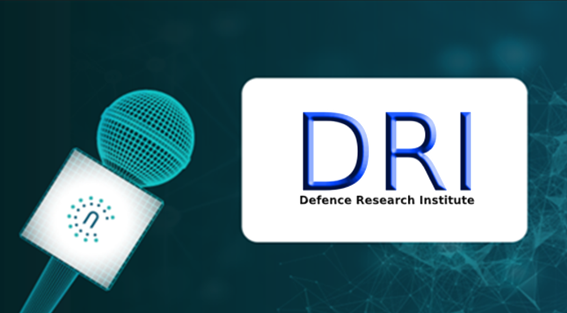
11 Apr Interview with the Defence Research Institute, France
The Defence Research Institute are a partner in the NOTIONES project. What is your role within this network of police and intelligence agencies across Europe?
The Defence Research Institute (DRI) plays a vital role within the NOTIONES network by contributing both strategic and technical expertise. As a French defence and strategy agency with a multidisciplinary approach, we provide insights that bridge the gap between emerging technologies and their application in defence, intelligence, and security contexts. Our involvement in NOTIONES spans across coordination, analysis, and interaction tasks—helping ensure coherence between practitioners, policymakers, and researchers. We bring particular value through our experience in intelligence ethics, OSINT and web analysis, and innovation monitoring. This broad engagement allows us to act as both a contributor and a connector, aligning cutting-edge research with the needs of European security agencies. Additionally, our staff—comprising professionals with backgrounds in the UN, OSCE, and the private sector—supports dialogue across diverse stakeholder groups in Europe’s security ecosystem.
What activities of the NOTIONES project are you currently progressing?
At present, DRI is actively engaged in several ongoing activities within NOTIONES. We are supporting Task 5.3, which focuses on research monitoring through horizon scanning. Here, we collaborate closely with other partners to identify emerging technologies and assess their potential implications for the intelligence and security communities. In addition, we participate in the planning and execution of stakeholder engagement under WP6 and are involved in WP7 activities related to workshops and conferences. These engagements allow us to both share our knowledge and gather valuable insights from law enforcement and intelligence practitioners across Europe. Our participation ensures that the outcomes of NOTIONES reflect real-world needs and are informed by a multidisciplinary perspective.
How will the engagement of the Defence Research Institute in the NOTIONES project support your business?
Participation in NOTIONES significantly strengthens DRI’s strategic positioning as a key player in European defence and security innovation. The project provides a platform to engage directly with practitioners, research institutions, and policymakers, enhancing our visibility and influence within the EU security research landscape. By contributing to high-level discussions on intelligence ethics, innovation monitoring, and cybersecurity, we reinforce our credibility and expand our network. This engagement allows us to refine our internal methodologies and remain ahead of emerging trends, which is critical to maintaining the quality of our consulting and research services. Moreover, our involvement in project coordination and stakeholder engagement offers valuable operational experience that directly benefits our future participation in EU-funded initiatives.
What are the benefits to the Defence Research Institute of participating in European security research and innovation projects?
Engaging in European security research projects offers DRI multiple strategic and operational benefits. Firstly, it allows us to stay at the forefront of technological and policy developments across the EU, which is vital for an organization focused on defence and strategic foresight. Secondly, it enables cross-sector collaboration with a diverse network of institutions, including security practitioners, academics, and technology developers. This broadens our knowledge base and allows us to contribute to and benefit from shared expertise. Participation also enhances our credibility and provides direct access to funding opportunities, helping us grow our R&D portfolio. Finally, it aligns our work with broader European policy objectives and contributes to shaping the future of security innovation on the continent.
Are you engaging in other European research and innovation projects?
Yes, in addition to NOTIONES, the Defence Research Institute is involved several projects among funded within an EDIDP and EDF working programmes. To name a few: DECISMAR focuses on decision-making and maritime awareness technologies, and our contribution includes strategic analysis and technological insights for situational awareness and threat detection. Also, DRI is participating in ACTING – (Advanced European platform and network of Cybersecurity training and exercises centres), that delivers an organized and coordinated approach to strengthen the EU cyber defence. And NEMO (laNguagE Modules develOpment) project will leverage sophisticated AI methods based on Machine Learning, Deep Learning and Large Language Models. Being part of NOTIONES, DECISMAR, NEMO and ACTING highlights our versatility in dealing with different dimensions of European security—ranging from maritime defence to cyber intelligence and radicalization prevention. Participation in multiple projects enables us to leverage synergies, share best practices across initiatives, and maintain a consistent presence in EU defence and security research efforts.
How does Defence Research Institute assess which research and innovation projects to progress?
DRI follows a strategic approach when selecting projects, prioritizing those that align with our core expertise and mission to bridge technology, strategy, and security. We assess each opportunity based on several criteria: alignment with EU and national priorities, potential for innovation impact, the relevance of the consortium partners, and the strategic value of the outcomes. We also consider how a project may enhance our internal capabilities and expand our knowledge in critical areas such as cybersecurity, AI in defence, or counter-terrorism. Projects with strong practitioner engagement and the potential to influence real-world policy and operations are particularly attractive. Ultimately, our goal is to invest in initiatives where our multidisciplinary expertise can deliver meaningful contributions while fostering growth.
How did you become engaged in police and security research and innovation activity? And what experience do you bring to support the delivery of the NOTIONES project?
DRI’s engagement in security research stems from our longstanding commitment to understanding and addressing complex defence and geopolitical challenges. Our team includes professionals with decades of experience in international organizations such as the UN and OSCE, as well as the private sector. This background enables us to approach innovation from both operational and policy-oriented perspectives. Over the years, we have participated in various international projects related to terrorism prevention, counter-radicalization, cybercrime mitigation, and critical infrastructure protection. Our strength lies in combining strategic insight with technical know-how across areas like artificial intelligence, cyber warfare, and detection systems. This experience directly supports our contributions to NOTIONES, particularly in tasks related to horizon scanning, intelligence ethics, and stakeholder engagement.
What advice would you give to police, defence, intelligence and security agencies seeking to engage in European security research and innovation?
Our main advice is to approach EU research and innovation as a strategic opportunity—not just for funding, but for meaningful collaboration and transformation. Agencies should build internal capacity to engage with research frameworks and maintain partnerships with organizations that bridge policy, practice, and technology. It’s also crucial to stay open to multidisciplinary approaches—projects like NOTIONES succeed because they combine technical expertise with ethical, legal, and operational insights. Start small if necessary, but stay engaged and contribute to shaping research that reflects real-world priorities. Lastly, don’t underestimate the value of long-term networks—consistent participation leads to greater influence and more impactful outcomes.
What are the key lessons you have learned in delivering security research and innovation projects?
One key lesson is the importance of adaptability. Security challenges evolve rapidly, and successful projects must be able to pivot and address new developments in real time. Another is the value of stakeholder engagement—projects are most impactful when they incorporate feedback from end users like law enforcement and intelligence officers. We’ve also learned that ethics and trust are not optional; they must be embedded from the start, especially when dealing with technologies like AI and surveillance. Finally, we’ve seen that success depends on strong coordination among diverse partners—clear communication, shared goals, and mutual respect are what transform ideas into practical innovations.
Profile:

Bio:
Pier Giuseppe CASUCCINI BONCI has 38 years of experience in the Information Technologies (IT) field. At first in IBM SEMEA as System Engineer, concerning mainly Data Management and Security (and then as Sales Representative), focusing in the Italian Financial domain. After a passage at the major Insurer Assicurazioni Generali Group Head office in Trieste, in charge of the International IT coordination of the Group’s Branches and Subsidiaries, from 1994 on he settled in Paris as Director of IT, Organization and Studies’ Bureau at the Insurer L’Equité SA. Afterwards he was appointed Chief Internal Control and Data Privacy Manager at Assurances France Generali Head Office, later adding the responsibility of Physical and Access Security Management. Later on, he took the responsibility as IT Compliance Officer, Risk Evaluation and in the end, he was appointed IT Auditor and Responsible of the French Generali’s Branch IT Control Programme. He takes part in some EC funded projects about Security and Defence Research, like DECISMAR, ACTING, NOTIONES and NEMO. He holds a graduate degree in Statistical Sciences and Econometrics from Bologna University in Italy. He speaks fluently Italian, French, Russian, English and Spanish, as well Ukrainian end German at a lesser extent.
Contact details:
Website: https://www.defenceresearchinstitute.eu/old-home
Email: piero.casuccini@defenceresearchinstitute.eu
info@defenceresearchinstitute.eu




